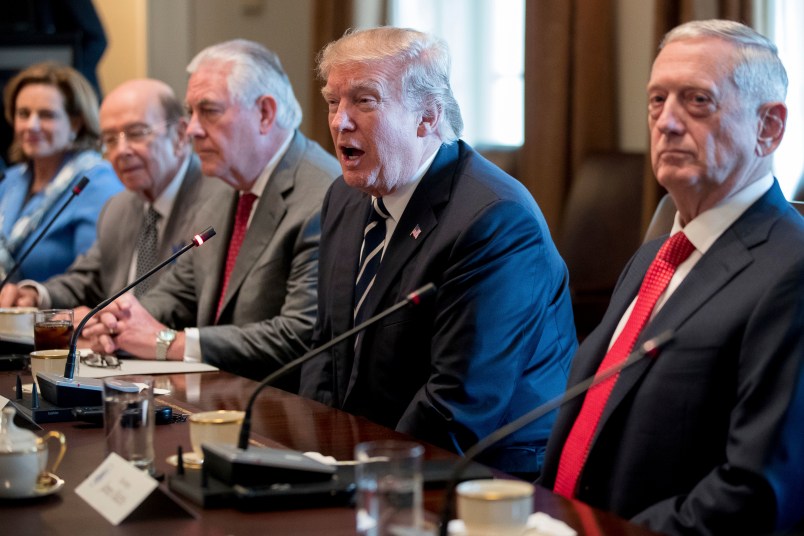Less than a week after President Donald Trump contradicted his own State Department after Secretary of State Rex Tillerson asked Gulf states to ease their blockade of Qatar, the Trump administration finalized the sale of billions of dollars worth of military equipment to the country.
Defense Secretary James Mattis met with Qatari Defense Minister Khalid al-Attiyah to sign off on a previously-approved deal for $12 billion worth of F-15 fighter jets, part of a more-than-$20 billion package approved by Congress and the Obama administration in November 2016, CBS News reported.
Defense Department spokesman Lt. Col. Roger Cabiness told CNN Wednesday that the sale “will give Qatar a state of the art capability and increase security cooperation and interoperability between the United States and Qatar.”
Qatar’s ambassador to the United States posted a picture of the signing ceremony online, writing “Qatar signs LOA for the purchase of the F-15QA fighter jets creating 60,000 new jobs in 42 states across the United States. Two hours later, he wished Trump a happy birthday.
Several Gulf states and their allies abruptly cut off relations with Qatar beginning June 5, blaming the nation for funding extremist movements.
On June 9, Secretary of State Rex Tillerson urged the nations blockading Qatar to “cease,” saying “[t]here are humanitarian consequences to this blockade. We are seeing shortages of food, families are being forcibly separated, and children pulled out of school. We believe these are unintended consequences, especially during this Holy Month of Ramadan, but they can be addressed immediately.”
Hours later, at a press briefing, Trump said “The nation of Qatar, unfortunately has historically been a funder of terrorism at a very high level” and recalled his attendance at the Arab-Islamic American Summit in May as an inciting incident for the blockade.
“In the wake of that conference, nations came together and spoke to me about confronting Qatar over its behavior,” he said. “So we had a decision to make. Do we take the easy road or do we finally take a hard but necessary action? We have to stop the funding of terrorism.”
The day after the blockade began, Trump seemed to take some credit for it on Twitter:
So good to see the Saudi Arabia visit with the King and 50 countries already paying off. They said they would take a hard line on funding…
— Donald J. Trump (@realDonaldTrump) June 6, 2017
…extremism, and all reference was pointing to Qatar. Perhaps this will be the beginning of the end to the horror of terrorism!
— Donald J. Trump (@realDonaldTrump) June 6, 2017
At least one unnamed White House source told MSNBC two days later that Trump “may not have known” that Qatar is home to the militarily crucial Al Udeid Air Base.
On Wednesday, CNN noted, Tillerson told the House Foreign Affairs Committee that “[t]here is no gap between the President and myself or the State Department on policy,” only “differences in terms of how the President chooses to articulate” United States policy.







Mattis will put up with any and all Trump antics including treason (and the cabinet blowfest) as long as he is able to serve his real loyalty which is the Military-Industrial Complex.
Hypocrisy, thy name is Drumpf.
I just want to know if he knows now that we have a base there.
It’s almost as if Mattis is ignoring Don the Con to save his own neck.
How will Spicer or Spicer’s stand-in spin this one?